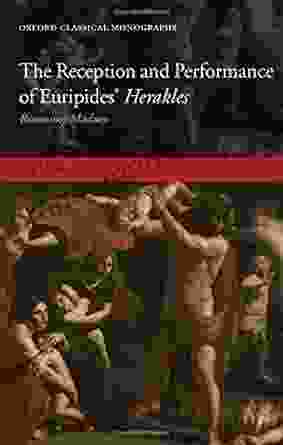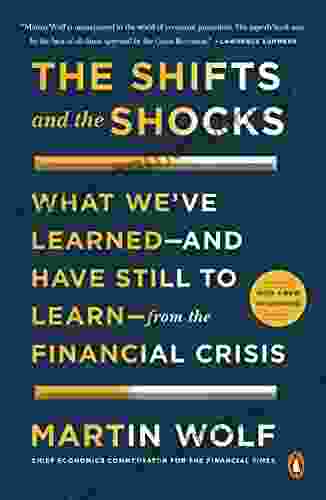Reasoning Madness: Oxford Classical Monographs

Madness has been a source of fascination and fear throughout human history. In the ancient Greek world, madness was often seen as a divine punishment or a sign of demonic possession. However, some Greek philosophers began to develop more rational explanations for madness, arguing that it was a natural phenomenon that could be understood and treated.
4.2 out of 5
| Language | : | English |
| File size | : | 3801 KB |
| Text-to-Speech | : | Enabled |
| Screen Reader | : | Supported |
| Print length | : | 400 pages |
| Lending | : | Enabled |
Reasoning Madness: Oxford Classical Monographs provides a comprehensive analysis of the development of Greek philosophical thought on the nature of madness and its relationship to reason. The book draws on a wide range of sources, including medical texts, philosophical treatises, and literary works. The author, Andrew Smith, argues that Greek philosophers gradually came to see madness as a natural phenomenon that could be understood and treated through rational means.
The Hippocratic Corpus
The Hippocratic Corpus is a collection of medical texts that were written in the 5th and 4th centuries BCE. These texts provide some of the earliest known medical explanations for madness. The Hippocratic authors argued that madness was a disease of the brain that could be caused by a variety of factors, including physical trauma, psychological stress, and environmental factors.
The Hippocratic authors also developed a number of treatments for madness. These treatments included bloodletting, purging, and dietary changes. The Hippocratic approach to madness was based on the idea that madness was a natural phenomenon that could be treated through rational means.
Plato
Plato was a Greek philosopher who lived in the 4th century BCE. Plato was one of the first philosophers to develop a systematic theory of madness. In his dialogue Phaedrus, Plato argues that madness is a divine gift that can lead to great insights and creativity.
Plato also argues that madness can be a negative force that can lead to irrational behavior and violence. Plato's theory of madness is complex and multifaceted. He sees madness as a both a positive and negative force that can have a profound impact on human life.
Aristotle
Aristotle was a Greek philosopher who lived in the 4th century BCE. Aristotle was one of the most influential philosophers in Western history. He developed a comprehensive system of philosophy that covered a wide range of topics, including logic, physics, metaphysics, and ethics.
Aristotle's theory of madness is based on his theory of the soul. Aristotle argues that the soul is the essential principle of life. He also argues that the soul is divided into two parts: the rational soul and the irrational soul.
Aristotle argues that madness is a disorder of the irrational soul. He believes that madness can be caused by a variety of factors, including physical trauma, psychological stress, and environmental factors. Aristotle also developed a number of treatments for madness. These treatments included music therapy, exercise, and dietary changes.
Later Greek Philosophy
After Aristotle, a number of other Greek philosophers developed their own theories of madness. These philosophers included the Stoics, the Epicureans, and the Neoplatonists. The Stoics argued that madness was a product of irrational desires. The Epicureans argued that madness was a result of physical disorders. The Neoplatonists argued that madness was a result of a separation from the divine.
The Greek philosophical tradition on madness culminated in the work of the Roman physician Galen. Galen was a prolific writer who produced over 500 works on a wide range of medical topics. Galen's theory of madness was based on the work of Aristotle. Galen argued that madness was a disorder of the brain that could be caused by a variety of factors, including physical trauma, psychological stress, and environmental factors.
The Greek philosophical tradition on madness is a rich and complex one. Greek philosophers were the first to develop systematic theories of madness. These theories were based on a variety of sources, including medical texts, philosophical treatises, and literary works. The Greek philosophical tradition on madness had a profound impact on the development of Western thought. It helped to establish the idea that madness is a natural phenomenon that can be understood and treated through rational means.
4.2 out of 5
| Language | : | English |
| File size | : | 3801 KB |
| Text-to-Speech | : | Enabled |
| Screen Reader | : | Supported |
| Print length | : | 400 pages |
| Lending | : | Enabled |
Do you want to contribute by writing guest posts on this blog?
Please contact us and send us a resume of previous articles that you have written.
 Top Book
Top Book Novel
Novel Fiction
Fiction Nonfiction
Nonfiction Literature
Literature Paperback
Paperback Hardcover
Hardcover E-book
E-book Audiobook
Audiobook Bestseller
Bestseller Classic
Classic Mystery
Mystery Thriller
Thriller Romance
Romance Fantasy
Fantasy Science Fiction
Science Fiction Biography
Biography Memoir
Memoir Autobiography
Autobiography Poetry
Poetry Drama
Drama Historical Fiction
Historical Fiction Self-help
Self-help Young Adult
Young Adult Childrens Books
Childrens Books Graphic Novel
Graphic Novel Anthology
Anthology Series
Series Encyclopedia
Encyclopedia Reference
Reference Guidebook
Guidebook Textbook
Textbook Workbook
Workbook Journal
Journal Diary
Diary Manuscript
Manuscript Folio
Folio Pulp Fiction
Pulp Fiction Short Stories
Short Stories Fairy Tales
Fairy Tales Fables
Fables Mythology
Mythology Philosophy
Philosophy Religion
Religion Spirituality
Spirituality Essays
Essays Critique
Critique Commentary
Commentary Glossary
Glossary Bibliography
Bibliography Index
Index Table of Contents
Table of Contents Preface
Preface Introduction
Introduction Foreword
Foreword Afterword
Afterword Appendices
Appendices Annotations
Annotations Footnotes
Footnotes Epilogue
Epilogue Prologue
Prologue Susan Hatler
Susan Hatler Rupnarayan Bose
Rupnarayan Bose Tom Purcell
Tom Purcell Todd Miller
Todd Miller Wendy Rae
Wendy Rae E J Kitchens
E J Kitchens John Freeman
John Freeman Andrew C Shurtleff
Andrew C Shurtleff Kate Chopin
Kate Chopin Thomas Lubben
Thomas Lubben John Kenney
John Kenney Douglas C Montgomery
Douglas C Montgomery The French Femme
The French Femme Amy Mcculloch
Amy Mcculloch Bill Donahue
Bill Donahue Giovanni Rigters
Giovanni Rigters Tony Hillerman
Tony Hillerman Barry Leskin
Barry Leskin Gemma Liviero
Gemma Liviero Eddie Robson
Eddie Robson
Light bulbAdvertise smarter! Our strategic ad space ensures maximum exposure. Reserve your spot today!

 Jan MitchellAdventures in Contentment: A Journey to Find True Fulfillment in the Simple...
Jan MitchellAdventures in Contentment: A Journey to Find True Fulfillment in the Simple...
 Guillermo BlairFaith, Hope, and Marriage: A Harlequin Comics Journey Through Love, Loss, and...
Guillermo BlairFaith, Hope, and Marriage: A Harlequin Comics Journey Through Love, Loss, and... Ervin BellFollow ·19.7k
Ervin BellFollow ·19.7k Ken FollettFollow ·7.7k
Ken FollettFollow ·7.7k Langston HughesFollow ·18.7k
Langston HughesFollow ·18.7k Devin RossFollow ·13.8k
Devin RossFollow ·13.8k Casey BellFollow ·7.7k
Casey BellFollow ·7.7k Kendall WardFollow ·3.3k
Kendall WardFollow ·3.3k Ralph Waldo EmersonFollow ·16.7k
Ralph Waldo EmersonFollow ·16.7k Colby CoxFollow ·6.9k
Colby CoxFollow ·6.9k

 Jesus Mitchell
Jesus MitchellThe Diabetics Menu: Your Low Carb Options
If you're living with diabetes, you may be...

 Danny Simmons
Danny SimmonsThe Sam Reilly Collection: A Treasure Trove of...
In the realm of...

 Vic Parker
Vic ParkerThe Shepherdess of Siena: The Extraordinary Life of Saint...
Catherine of Siena, known as the...

 Christian Carter
Christian CarterDive into the Mystical World of Meraki Syren: A Literary...
A Literary Odyssey Through the Depths...

 Eric Hayes
Eric HayesSimplest Method on How to Remove Credit Cards from Your...
Do you have multiple credit cards...
4.2 out of 5
| Language | : | English |
| File size | : | 3801 KB |
| Text-to-Speech | : | Enabled |
| Screen Reader | : | Supported |
| Print length | : | 400 pages |
| Lending | : | Enabled |










